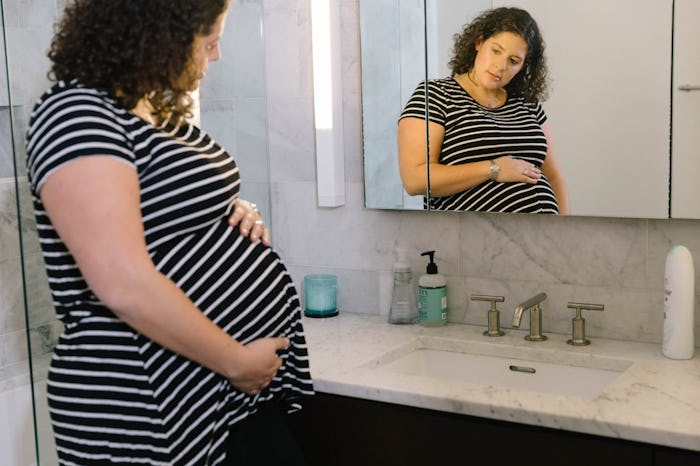Life
What Does It Mean For Your Belly To Drop? Experts Explain
Women look for many signs to indicate when they’re about to go into labor. Some of the more important ones, like contractions and your water breaking, are pretty obvious. But what about the more subtle ones, like when family members comment on your belly dropping? What does it mean for your belly to drop anyway?
Dr. Adrienne Zertuche, an OB-GYN at a Division of Atlanta Women’s Healthcare Specialists, tells Romper, “Toward the end of pregnancy, the baby may descend into your pelvis as it readies for the upcoming labor and delivery process. Many refer to this event as ‘dropping’ or ‘lightening.’" However, “lightening” doesn’t necessarily mean you’re about to go into labor, as “some women describe their baby ‘dropping’ several weeks before they start to have uterine contractions, while others don’t ‘drop’ until just a few hours before going into labor,” Zertuche adds.
Dr. G. Thomas Ruiz of Orange Coast Memorial Medical Center in Fountain Valley, California, recently spoke to Romper about what it feels like when your belly drops and described two main clues that indicate it’s happening. He says you’ll feel your baby’s head deep in your pelvis — which unfortunately causes you to pee more — and you can visually see your belly has dropped lower. “But it isn’t necessarily a ‘green light’ that you’ll go into labor ASAP," he notes.
Even though lightening isn’t predicative of when labor will begin, Zertuche says if you’re not at 37 weeks yet and your belly drops while you “feel a sudden and intense increase in vaginal pressure, especially if it is accompanied by cramping or contractions, you should call and discuss your symptoms with your obstetrician. He or she may need to evaluate you for preterm labor."
Unfortunately, as soon as your belly drops, that doesn't mean your pregnancy is coming to an end. I know you're probably ready — it's been a long 37+ weeks. But at least you can breathe a little better now, since the baby isn't pressing your organs up into your lungs, right? As long as you're past 37 weeks, it's a perfectly healthy, normal, and natural part of the process.
